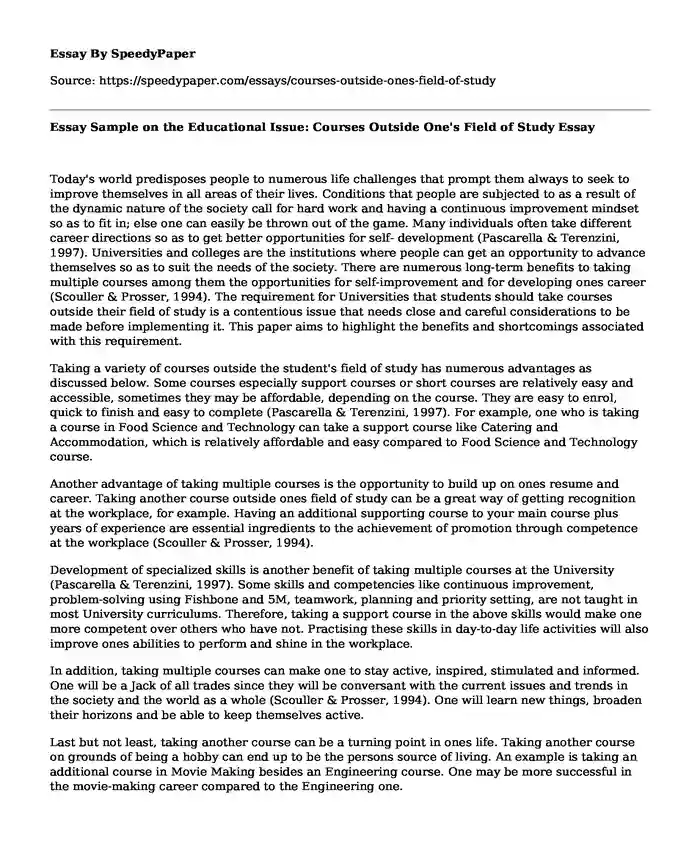Today's world predisposes people to numerous life challenges that prompt them always to seek to improve themselves in all areas of their lives. Conditions that people are subjected to as a result of the dynamic nature of the society call for hard work and having a continuous improvement mindset so as to fit in; else one can easily be thrown out of the game. Many individuals often take different career directions so as to get better opportunities for self- development (Pascarella & Terenzini, 1997). Universities and colleges are the institutions where people can get an opportunity to advance themselves so as to suit the needs of the society. There are numerous long-term benefits to taking multiple courses among them the opportunities for self-improvement and for developing ones career (Scouller & Prosser, 1994). The requirement for Universities that students should take courses outside their field of study is a contentious issue that needs close and careful considerations to be made before implementing it. This paper aims to highlight the benefits and shortcomings associated with this requirement.
Taking a variety of courses outside the student's field of study has numerous advantages as discussed below. Some courses especially support courses or short courses are relatively easy and accessible, sometimes they may be affordable, depending on the course. They are easy to enrol, quick to finish and easy to complete (Pascarella & Terenzini, 1997). For example, one who is taking a course in Food Science and Technology can take a support course like Catering and Accommodation, which is relatively affordable and easy compared to Food Science and Technology course.
Another advantage of taking multiple courses is the opportunity to build up on ones resume and career. Taking another course outside ones field of study can be a great way of getting recognition at the workplace, for example. Having an additional supporting course to your main course plus years of experience are essential ingredients to the achievement of promotion through competence at the workplace (Scouller & Prosser, 1994).
Development of specialized skills is another benefit of taking multiple courses at the University (Pascarella & Terenzini, 1997). Some skills and competencies like continuous improvement, problem-solving using Fishbone and 5M, teamwork, planning and priority setting, are not taught in most University curriculums. Therefore, taking a support course in the above skills would make one more competent over others who have not. Practising these skills in day-to-day life activities will also improve ones abilities to perform and shine in the workplace.
In addition, taking multiple courses can make one to stay active, inspired, stimulated and informed. One will be a Jack of all trades since they will be conversant with the current issues and trends in the society and the world as a whole (Scouller & Prosser, 1994). One will learn new things, broaden their horizons and be able to keep themselves active.
Last but not least, taking another course can be a turning point in ones life. Taking another course on grounds of being a hobby can end up to be the persons source of living. An example is taking an additional course in Movie Making besides an Engineering course. One may be more successful in the movie-making career compared to the Engineering one.
Despite the numerous advantages that come with taking a variety of courses outside ones field of study, this requirement is deemed to face shortcomings as illustrated in the subsequent paragraphs. Time can be a drawback towards taking multiple courses. For instance, it might take a relatively longer time to complete these courses than taking an individual course. Also, taking parallel courses can result in a conflict of time to the student because the class timings of these courses may overlap if not properly managed (Scouller & Prosser, 1994).
Another disadvantage is that taking multiple courses may be expensive to the student hence not affordable (Pascarella & Terenzini, 1997). One can end up dropping out of the University as a result of the inability to raise the tuition fees.
In some cases, these courses may be engaging to the student, and this can result in mental and physical stress that can have detrimental effects to those involved. It is always healthy for one to have time to unwind and relax after a tiring and engaging activity.
To tackle the above shortcomings that come with this issue, Universities may decide to subsidise the fees of their courses so as to make them affordable to students. Proper planning and management of these courses should be done to reduce overlaps in course timings, over-engagement and abnormally long completion time for the courses (Scouller & Prosser, 1994).
In conclusion, taking multiple courses at the University is achievable and has numerous benefits as seen above. However, Universities need to analyze the possibilities and shortcomings of this action carefully so as to promote a healthy learning environment to those involved.
References
Pascarella, E. T., & Terenzini, P. T. (1997). Studying college students in the 21st century: Meeting new challenges. The Review of Higher Education,21(2), 151-165.
Scouller, K. M., & Prosser, M. (1994). Students' experiences in studying for multiple choice question examinations. Studies in Higher Education, 19(3), 267-279.
Cite this page
Essay Sample on the Educational Issue: Courses Outside One's Field of Study. (2020, Apr 13). Retrieved from https://speedypaper.com/essays/courses-outside-ones-field-of-study
Request Removal
If you are the original author of this essay and no longer wish to have it published on the SpeedyPaper website, please click below to request its removal:
- Free Essay Example: Car Guys v Bean Counters
- Why Is the Supreme Court Case of Marbury v. Madison Important? Law Essay Sample
- Free Essay on Change Management Models
- Illness & Loss - Free Essay on Grief
- FreeEssay Sample on Maslow and Cast Away Movie
- Essay Sample on the US-China Conflict Resolution
- Relationship Between Self-efficacy and Symptoms of Anxiety and Depression
Popular categories





